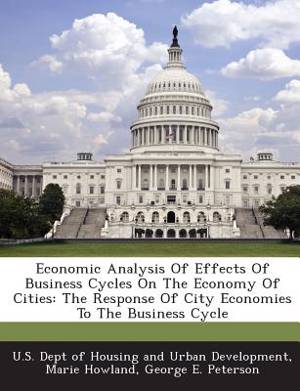
Door een staking bij bpost kan je online bestelling op dit moment iets langer onderweg zijn dan voorzien. Dringend iets nodig? Onze winkels ontvangen jou met open armen!
- Afhalen na 1 uur in een winkel met voorraad
- Gratis thuislevering in België vanaf € 30
- Ruim aanbod met 7 miljoen producten
Door een staking bij bpost kan je online bestelling op dit moment iets langer onderweg zijn dan voorzien. Dringend iets nodig? Onze winkels ontvangen jou met open armen!
- Afhalen na 1 uur in een winkel met voorraad
- Gratis thuislevering in België vanaf € 30
- Ruim aanbod met 7 miljoen producten
Zoeken
Economic Analysis Of Effects Of Business Cycles On The Economy Of Cities
The Response Of City Economies To The Business Cycle
Marie Howland, George E Peterson
Paperback | Engels
€ 24,45
+ 48 punten
Uitvoering
Omschrijving
A severe recession in 1973 to 1975 followed by a weak expansion from 1975 to 1979 and another recession in 1979 through 1983 left many metropolitan areas with short falls in tax revenues and rising social costs. The effects of the weak national economy during this period were felt particularly severely in the central cities, which were already experiencing the stresses of secular declines in employment and the number of middle income residents. If the cyclical instability of the last decade is a forerunner of the remainder of the 1980s, it is clear that an understanding of central city and suburban economies requires a better understanding of the interaction between the business cycle and long run metropolitan growth. The purpose of this paper is to begin to fill this gap in our knowledge.In particular, this paper addresses the relationship between a metropolitan economy's long run growth and its response to the national business cycle.
Specificaties
Betrokkenen
- Auteur(s):
- Uitgeverij:
Inhoud
- Aantal bladzijden:
- 28
- Taal:
- Engels
Eigenschappen
- Productcode (EAN):
- 9781288927869
- Verschijningsdatum:
- 15/03/2013
- Uitvoering:
- Paperback
- Formaat:
- Trade paperback (VS)
- Afmetingen:
- 189 mm x 246 mm
- Gewicht:
- 68 g

Alleen bij Standaard Boekhandel
+ 48 punten op je klantenkaart van Standaard Boekhandel
Beoordelingen
We publiceren alleen reviews die voldoen aan de voorwaarden voor reviews. Bekijk onze voorwaarden voor reviews.











